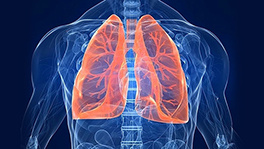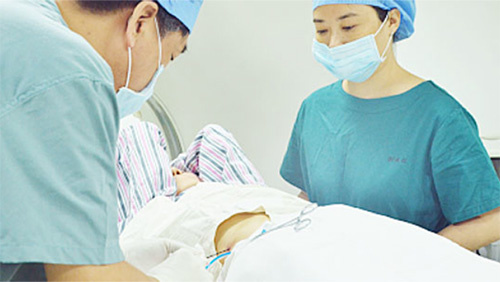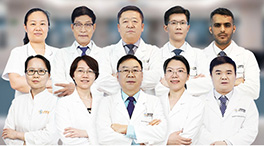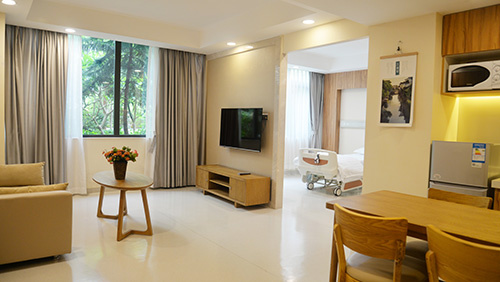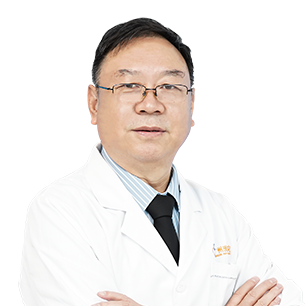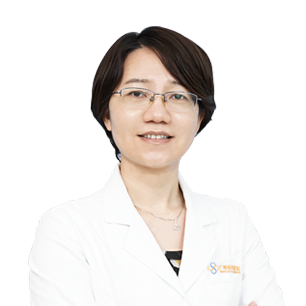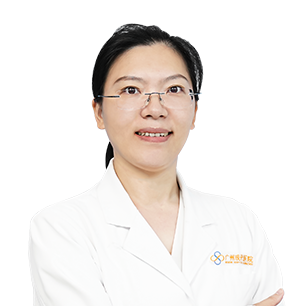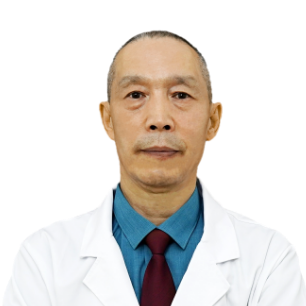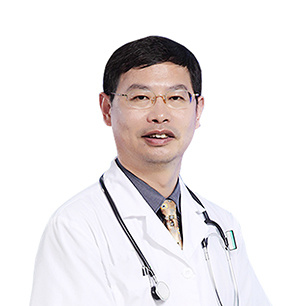Minimally Invasive • Less Trauma • Fewer Side Effects
In recent years, lung cancer has demonstrated a high incidence and mortality rate both in Malaysia and globally, becoming one of the leading causes of cancer-related deaths among men. Patients often face numerous decisions after diagnosis: ShouldI undergo surgery? CanI tolerate the side effects of radiotherapy and chemotherapy? If the cancer is in an advanced stage, is there still hope for treatment?
Suitable patients for lung cancer treatment at Modern Cancer Hospital Guangzhou:
✅ Those unwilling to undergo traditional open-chest surgery.
✅ Elderly patients or those with multiple comorbidities who cannot tolerate chemotherapy.
✅ Patients hoping to preserve lung function through approaches such as cryotherapy or seed implantation.
✅ Individuals who have experienced recurrence after previous treatments and are seeking alternative therapies.
✅ Patients pursuing personalized treatments with minimal side effects and a focus on maintaining a high quality of life.
✅ Those who are not suitable for or unwilling to undergo surgical resection.
✅ Patients with advanced-stage or recurrent lung cancer aiming to prolong life and improve quality of life.
✅ Individuals wishing to integrate traditional Chinese medicine to alleviate treatment side effects.
✅ International patients with limited budgets but in need of cost-effective treatment options.
In the following content, we will delve into the core technologies, medical treatment processes, and transnational service features of Modern Cancer Hospital Guangzhou in lung cancer treatment, comparing them with local and international hospitals. This aims to assist lung cancer patients in making more informed and reassuring choices, helping them find a treatment approach that better suits their needs.
I. Modern Cancer Hospital Guangzhou | Overview of Lung Cancer Treatment Technologies
Modern Cancer Hospital Guangzhou is committed to establishing a treatment system that integrates “minimally invasive, Chinese and Western medicine integration, and personalized precision therapy,” which is particularly suitable for lung cancer patients experiencing post-surgical recurrence, those who are elderly or physically frail, or those seeking treatment options with fewer side effects.
Technologies | Target Patient Groups | Advantages |
Interventional Therapy | Advanced-stage lung cancer | High-concentration drugs target tumors precisely, fewer side effects than intravenous chemotherapy |
Photodynamic Therapy | Bronchial obstruction or local mass | Non-invasive laser activates drugs to kill cancer cells, preserves lung function |
Cryoablation | Inoperable tumors or tumors with post-surgical recurrence | -180°C cryotherapy damages tumors with minimal trauma and quick recovery |
Nanoknife | Tumors adjacent to critical structures such as blood vessels / trachea | Electric field resection protects normal tissues, ideal for high-risk areas |
Iodine-125 Seed Implantation | Tumors in advanced stages or in inoperable locations | Endogenous continuous radiotherapy reduces tumor size and achieves local tumor control |
Targeted Therapy + Immunotherapy | Patients with lung cancer at various stages | Precision drugs + immune activation personalize cancer control, fast & targeted |
TCM Supportive Therapy | Patients with lung cancer at various stages | Regulates constitution, eases chemo/radio side effects, boosts immunity |
Modern Cancer Hospital Guangzhou commonly adopts a “multi-technology combination” strategy, such as interventional therapy combined with seed implantation and Traditional Chinese Medicine conditioning, to enhance treatment efficacy while helping patients maintain their quality of life.
II. Medical Consultation Process and Appointment Methods
To facilitate cross-border medical treatment for patients from Southeast Asia, Modern Cancer Hospital Guangzhou offers a variety of channels for appointment bookings and consultations. Whether you are in Malaysia, Singapore, or Mainland China, you can conveniently access professional services.
1. Online Consultation Methods
Official Website Appointment Form: Click to fill in and submit the form. A dedicated specialist will then contact you for follow-up.
WhatsApp (for Malaysia): +60 10-898 8919
Email Consultation: [email protected]
2. Offline Consultation Service Address:
Cities | Address | Services Provided |
Kuala Lumpur | 165, Jalan Ampang, Citibank Tower, Kuala Lumpur, Malaysia (Postal Code: 50450) | Report Interpretation, Treatment Recommendations, On-site Assessment |
Penang | Block B, BHL Tower, Jalan Sultan Ahmad Shah, George Town, Penang, Malaysia (Postal Code: 10050) | Health Lectures, Remote Doctor Video Consultations |
Singapore | Zhongjing TCM Institution Ple Ltd 701 Sims Drive, LHK Building | Initial Consultation, Cross-border Consultation Coordination and Arrangement |
Warm Reminder: Prior appointment is mandatory to secure an exclusive consultation slot.
Should you require further assistance, please feel free to contact us at any time. We will provide you with attentive and comprehensive service throughout the process.
III. Cost Structure and Service Support (For Informational Only)
In the lung cancer treatment, costs can vary significantly depending on the choice of technology, duration of the treatment course, and combination of medications. Modern Cancer Hospital Guangzhou offers phased billing along with the formulation of individualized treatment plans to ensure clarity and transparency in costs. Below is an explanation of the common cost components:
Projects Categories | Content Description |
Teleconsultation | Offered mainly as a public welfare service, enabling patients to obtain preliminary professional advice at no cost |
Preliminary Examination and Assessment | Covers routine tests like blood tests, ultrasounds, and imaging to determine the patient’s baseline condition |
Minimally Invasive Treatment Programs | Includes interventions such as cryotherapy, particle implantation, etc., tailored according to the treatment course and selected technology |
Comprehensive Individualized Treatment Plans | Developed based on tumor stage, patient’s physical state, and treatment goals, outlining a phased, integrated approach |
TCM Conditioning | Customized based on individual constitutions with a set treatment cycle to help reduce side effects and improve overall condition by addressing patients’ physical traits and symptoms |
✓ Specific costs will be determined after a thorough evaluation of the patient's condition. We support phased treatment with step-by-step billing, ensuring transparency and traceability of expenses.
✓ In some cases, patients may apply for complementary charitable financial assistance to help reduce costs.
✓ We offer specialized services for international patients, including assistance with cross-border medical consultation financial planning and arrangements.
Note: A professional team will provide transparent and personalized cost proposals after evaluating the patient’s condition.
For more detailed information on treatment plans and welfare support, please feel free to contact us for a consultation. We are committed to providing every patient with trustworthy professional care and compassion.
IV. China-Malaysia International Lung Cancer Treatment Comparison | Key Decision Factors for Patients
The choice of lung cancer treatment plans is not solely based on technology and efficacy but also encompasses factors such as accessibility of care, financial burden, and language support. Below is a general comparison between Modern Cancer Hospital Guangzhou, local private hospitals in Malaysia, and international centers in Singapore / South Korea, based on dimensions of concern for patients (information is referenced from publicly available sources and international medical treatment experiences, for reference only):
Comparison Dimensions | Modern Cancer Hospital Guangzhou | |
Treatment Technologies Types |
| |
Overall Cost Levels |
| |
Medical Specialization |
| |
Medical Consultation Process Convenience | Supporting online consultations, remote diagnosis, and international referrals—dedicated global service team for seamless care | |
Language and Service Support | Local service points in Malaysia/Singapore, ensuring seamless communication in multiple languages including Chinese and English | |
MDT Approach | All lung cancer cases are routinely included in MDT team discussions | |
Ideal Candidates | Those unwilling to undergo thoracotomy/aiming to preserve lung function/elderly patients or those with multiple comorbidities/seeking options with minimal side effects |
Mainstream Private Hospitals in Malaysia | International Medical Centers in Singapore/South Korea | |||
|
| |||
|
| |||
|
| |||
Typically requires physician referral or self-pay consultation, with a relatively standardized process | Long wait times— book weeks to months in advance due to high demand | |||
English as Primary Language with Select Chinese Translation Support | English/Korean are primarily used; some hospitals have international departments but language barriers may still exist | |||
Most top-tier private hospitals maintain dedicated MDT team | Most hospitals have established MDT mechanisms, suitable for patients with complex or multisystem diseases | |||
Patients who follow standard treatment protocols and can complete full cycles of radiotherapy/chemotherapy | High-budget patients seeking access to the latest experimental drugs or top international treatment resources |
*The above comparisons are compiled based on publicly available information and patient feedback. There may be slight variations in the specific situations of individual hospitals. It is recommended to communicate and confirm in advance before seeking medical treatment.
Medical Advice Summary
✅ Considering multiple aspects such as comprehensive treatment technologies, service processes, cost structures, and language support, if you or your
✅ family members hope to: Avoid thoracotomy and opt for minimally invasive options like interventional therapy, cryotherapy, and particle implantation. Control tumors and alleviate side effects through individualized and combined therapeutic approaches.
✅ Pursue a treatment path that balances efficacy with cost-effectiveness.
Modern Cancer Hospital Guangzhou holds significant advantages in lung cancer treatment. It is particularly suitable for patients who are physically weak, elderly, have experienced recurrence, or wish to preserve lung function.
Unsure about whether to travel to China for medical treatment?
We recommend that you can make an appointment through our International Service Centers located in Malaysia/Singapore:
Ø We offer free preliminary review of your medical records + remote video assessment by oncology experts;
Ø We assist in confirming the stage of your illness, the feasibility of treatment, and the suitability of treatment technologies;
Ø This helps you obtain professional judgment and preliminary treatment advice before your departure.
We will provide you and your family with superior treatment options for lung cancer in a professional, safe, and transparent manner.
V. Cross-border Medical Treatment Process Guide
To facilitate smooth medical visits for patients from Malaysia, Singapore, and other Southeast Asian regions, Modern Cancer Hospital Guangzhou provides a one-stop remote appointment service. The process is convenient, with dedicated staff assisting throughout:
1.Telephone/online appointment for an in-person consultation
2.Remote consultation with experts
3.Assistance from local international service centers in visa application
4.Dedicated personnel to pick you up from the airport and escort you to the hospital
5.Admission to the hospital for MDT diagnosis and treatment
6.Discharge upon completion of treatment
7.Follow-up visits
8.Regular follow-up consultations


